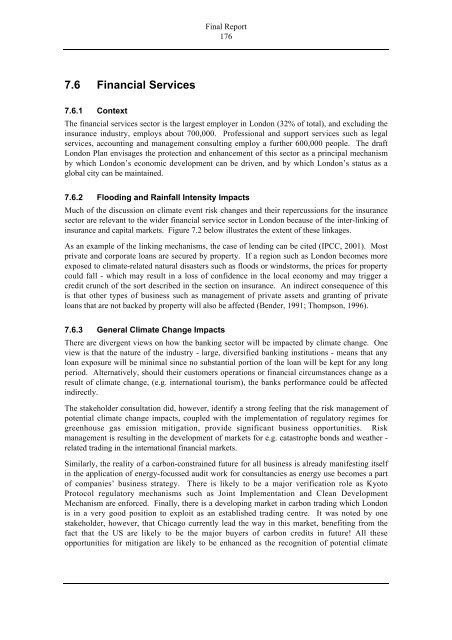London scoping - ukcip
London scoping - ukcip
London scoping - ukcip
You also want an ePaper? Increase the reach of your titles
YUMPU automatically turns print PDFs into web optimized ePapers that Google loves.
7.6 Financial Services<br />
Final Report<br />
176<br />
7.6.1 Context<br />
The financial services sector is the largest employer in <strong>London</strong> (32% of total), and excluding the<br />
insurance industry, employs about 700,000. Professional and support services such as legal<br />
services, accounting and management consulting employ a further 600,000 people. The draft<br />
<strong>London</strong> Plan envisages the protection and enhancement of this sector as a principal mechanism<br />
by which <strong>London</strong>’s economic development can be driven, and by which <strong>London</strong>’s status as a<br />
global city can be maintained.<br />
7.6.2 Flooding and Rainfall Intensity Impacts<br />
Much of the discussion on climate event risk changes and their repercussions for the insurance<br />
sector are relevant to the wider financial service sector in <strong>London</strong> because of the inter-linking of<br />
insurance and capital markets. Figure 7.2 below illustrates the extent of these linkages.<br />
As an example of the linking mechanisms, the case of lending can be cited (IPCC, 2001). Most<br />
private and corporate loans are secured by property. If a region such as <strong>London</strong> becomes more<br />
exposed to climate-related natural disasters such as floods or windstorms, the prices for property<br />
could fall - which may result in a loss of confidence in the local economy and may trigger a<br />
credit crunch of the sort described in the section on insurance. An indirect consequence of this<br />
is that other types of business such as management of private assets and granting of private<br />
loans that are not backed by property will also be affected (Bender, 1991; Thompson, 1996).<br />
7.6.3 General Climate Change Impacts<br />
There are divergent views on how the banking sector will be impacted by climate change. One<br />
view is that the nature of the industry - large, diversified banking institutions - means that any<br />
loan exposure will be minimal since no substantial portion of the loan will be kept for any long<br />
period. Alternatively, should their customers operations or financial circumstances change as a<br />
result of climate change, (e.g. international tourism), the banks performance could be affected<br />
indirectly.<br />
The stakeholder consultation did, however, identify a strong feeling that the risk management of<br />
potential climate change impacts, coupled with the implementation of regulatory regimes for<br />
greenhouse gas emission mitigation, provide significant business opportunities. Risk<br />
management is resulting in the development of markets for e.g. catastrophe bonds and weather -<br />
related trading in the international financial markets.<br />
Similarly, the reality of a carbon-constrained future for all business is already manifesting itself<br />
in the application of energy-focussed audit work for consultancies as energy use becomes a part<br />
of companies’ business strategy. There is likely to be a major verification role as Kyoto<br />
Protocol regulatory mechanisms such as Joint Implementation and Clean Development<br />
Mechanism are enforced. Finally, there is a developing market in carbon trading which <strong>London</strong><br />
is in a very good position to exploit as an established trading centre. It was noted by one<br />
stakeholder, however, that Chicago currently lead the way in this market, benefiting from the<br />
fact that the US are likely to be the major buyers of carbon credits in future! All these<br />
opportunities for mitigation are likely to be enhanced as the recognition of potential climate

















